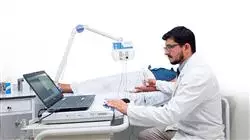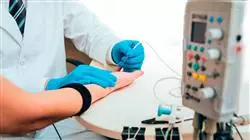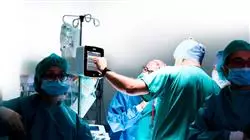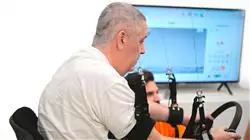University certificate
The world's largest faculty of medicine”
Introduction to the Program
Get fully trained in one of the most in-demand fields of medical work and be the physician every hospital would want to have"

All human body organs are innervated by the autonomic nervous system, so there are diseases of this system that have a significant negative impact on the independence of the patient who suffers from them. Such dysfunctions can present unique clinical difficulties and repercussions, and therefore require appropriately educated practitioners to address them.
This medical challenge, ranging from parkinsonian syndromes to multisystem atrophies or cerebellar ataxias, is a major obstacle for all professionals who have not acquired the relevant specialization, being a highly valued part of any healthcare team given the severity and common frequency of these pathologies.
Therefore, TECH presents this Postgraduate diploma in Neurophysiological Techniques and Protocols in the Assessment of Neuromuscular, Autonomic and Pain Conditions as a way of professional growth for any physician seeking a higher specialization. Thanks to the knowledge acquired during this degree, the graduate will effectively address all kinds of pathologies related to the autonomic nervous system, knowing the diagnoses and protocols applicable to each particular case.
A unique educational program in which, in addition, the student enjoys total freedom to take on the course load at his or her own pace. Without classes or classroom requirements, the student can download the entire syllabus from any device with an internet connection and study it at his or her own pace and interests.
Leave behind archaic, face-to-face teaching to join a program that understands your professional and personal needs"
This Postgraduate diploma in Neurophysiological Techniques and Protocols in the Assessment of Neuromuscular, Autonomic and Pain Conditions contains the most complete and up to date scientific program on the market. The most important features include:
- The development of case studies presented by physicians with expertise in neurophysiology
- The graphic, schematic, and eminently practical contents with which they are created, provide scientific and practical information on the disciplines that are essential for professional practice
- Practical exercises where the self-assessment process can be carried out to improve learning
- Its special emphasis on innovative methodologies
- Theoretical lessons, questions to the expert, debate forums on controversial topics, and individual reflection assignments
- Access to content from any fixed or portable device with an Internet connection
This is your great opportunity to grow professionally in a very specific medical field, supported by the best experts in neurophysiology"
The program’s teaching staff includes professionals from the sector who contribute their work experience to this training program, as well as renowned specialists from leading societies and prestigious universities.
The multimedia content, developed with the latest educational technology, will provide the professional with situated and contextual learning, i.e., a simulated environment that will provide immersive training programmed to train in real situations.
This program is designed around Problem Based Learning, whereby the professional must try to solve the different professional practice situations that arise during the academic year. For this purpose, the student will be assisted by an innovative interactive video system created by renowned and experienced experts.
Enroll today in this Postgraduate diploma in TECH and start now to improve your knowledge and possibilities of medical promotion"

Do you want to know the latest secrets of Neurophysiology? Join this program and become the medical professional you dream of"
Syllabus
As the contents of this Postgraduate diploma are so specific and concrete, TECH has created the best current educational methodology, with which students acquire the most complex knowledge in the most profitable way possible. Supported by excellent audiovisual material, both complete and detailed, the student has a reduced teaching load and at the same time a much more realistic perspective of the most advanced neurophysiological techniques and protocols.

Get your Postgraduate diploma in Neurophysiological Techniques and Protocols in the Assessment of Neuromuscular, Autonomic and Pain Conditions directly and quickly, without doing a final paper"
Module 1. Neurophysiological Techniques in the Diagnosis of Neuromuscular Diseases
1.1. Anatomy and Physiology of the Peripheral Nervous System
1.2. Sensory and Motor Nerve Conduction Studies
1.3. Reflexology and Late Responses
1.3.1. F Wave
1.3.2. A Wave
1.3.3. H Wave
1.3.4. T Reflex
1.4. Technical and Quality Considerations in Neuromuscular Electrodiagnostics. Procedural Errors. Precautions
1.5. Neurophysiological Assessment of Neuromuscular Junction Function
1.5.1. Repetitive Nerve Stimulation
1.5.2. Jitter Study with Single Fiber Needle and Concentric Needle
1.5.2.1. Voluntary Contraction
1.5.2.2. Axonal Stimulation
1.6. Principles of Electromyography. Electromyographic Response of the Normal Motor Unit. Insertion Activity. Motor Plate Activity. Motor Unit Potential. Pathological Muscle Activity
1.7. Techniques for Quantitative Estimation of Motor Units
1.8. Neurophysiological Study of the Facial and Trigeminal Nerves
1.8.1. MUNE
1.8.2. MUNIX
1.8.3. MUSIX
1.9. Neurophysiological Evaluation of the Respiratory System
1.9.1. Laryngeal Nerves and Muscles
1.9.2. Phrenic Nerve and Diaphragm Muscle
1.10. Neuromuscular Ultrasound
1.10.1. Basic Neural Semiology and Physical Basis Adapted to Ultrasound Study
1.10.2. Normal Anatomy and Ultrasound Correlation
1.10.2.1. Upper Limbs
1.10.2.2. Lower Extremities
1.10.3. Ultrasound Scanning of Peripheral Nerves
1.10.3.1. Upper Limbs
1.10.3.2. Lower Extremities
1.10.4. Ultrasound Diagnosis of
1.10.4.1. Upper Limbs
1.10.4.2. Lower Extremities
1.10.5. Advanced Image
1.10.6. Percutaneous Interventional Techniques
Module 2. Electroneuromyographic (ENMG) Protocols in the Diagnosis of Neuromuscular Diseases
2.1. Neurophysiological Study in Pathology of the Cervical Roots and Brachial Plexus
2.2. Neurophysiological Study in Pathology of Roots and Lumbosacral Plexus
2.3. Neurophysiological Examination of Upper Limb Nerve Pathology. Mononeuropathies and Focal Lesions
2.3.1. Median Nerve
2.3.2. Ulnar Nerve
2.3.3. Radial Nerve
2.3.4. Nerves of the Shoulder Girdle
2.3.5. Others
2.4. Neurophysiological Examination of Lower Limb Nerve Pathology. Mononeuropathies and Focal Lesions
2.4.1. Sciatic (ischial) Nerve
2.4.2. Femoral Nerve
2.4.3. Obturator Nerve
2.4.4. Others
2.5. Neurophysiological Examination of Polyneuropathies
2.6. Neurophysiological Examination of Myopathies. Muscular Dystrophies, Myotonias and Channelopathies
2.7. Neurophysiological Evaluation of Motor Neuron Diseases
2.8. Clinical-neurophysiological Correlation of Neuromuscular Transmission Disorders
2.8.1. Myasthenia
2.8.2. Lamber-Eaton Syndrome
2.8.3. Botulism
2.8.4. Others
2.9. Neurophysiological Study of Tremor and Other Movement Disorders
2.10. Neurophysiological Examination of Neuromuscular Pathology in Pediatric Age
Module 3. AutonomicNervous System. Pain. Other Complex Techniques or in Association with Other Specialties
3.1. Autonomic Nervous System
3.1.1. Anatomy
3.1.2. Physiology
3.1.3. Neurotransmission
3.2. Autonomic Dysfunction
3.2.1. Semiology
3.2.2. Pathology
3.2.2.1. Cardiovascular Disorders
3.2.2.2. Thermoregulation Disorders
3.2.2.3. Others
3.2.2.3.1. Autonomic Dysfunction in Neurodegenerative Diseases
3.2.2.3.2. Urological Dysfunction
3.3. Neurophysiological Tests for the Study and Assessment of Autonomic Disorders
3.4. Pain
3.4.1. Pathophysiology of Pain
3.4.2. Complex Regional Pain. Neuropathic Pain
3.4.3. Central Sensitization
3.5. Neurophysiological Techniques for the Evaluation of Painful Processes. Implications of Neurophysiology for its Diagnosis
3.5.1. Thermotest
3.5.2. CHEPs
3.5.3. Laser Evoked Potentials
3.6. Utility Monitoring Techniques under Special Conditions
3.6.1. Bispectral Index (BIS)
3.6.2. ANI / NIPE
3.6.3. Others
3.7. Application of Neurophysiological Techniques in Dentistry
3.7.1. Pathology
3.7.2. Utility Techniques and their Practical Application
3.8. Neurophysiological Studies of the Pelvic Floor
3.8.1. Combined Techniques useful in the Assessment of Pelvic Floor Neuromuscular Function
3.9. Clinical Neurophysiology and Biomechanics (I): Biomechanics of Gait
3.9.1. Instrumental Analysis of Kinetic, Kinematic and Electromyographic Patterns
3.9.2. Sequence of Muscle Activation in the Different Phases of Gait. Muscle Activation Maps
3.10. Clinical Neurophysiology and Biomechanics (II)
3.10.1. Neurophysiologic Evaluation of the Foot and Ankle
3.10.2. Combined Neurophysiological and Ultrasound Studies

his will be the degree that will give more quality to your resume, with enough endorsement to reach much better healthcare positions"
Postgraduate Diploma in Neurophysiologic Techniques and Protocols in the Assessment of Neuromuscular, Autonomic and Pain Diseases
At TECH Global University, we present our exclusive academic program: the Postgraduate Diploma in Neurophysiological Techniques and Protocols in the Assessment of Neuromuscular, Autonomic and Pain Diseases. If you are a health professional looking for specialization and advanced skills development, this program is for you. Our Postgraduate Diploma is delivered through online classes, giving you the flexibility to study from anywhere and tailor your learning to your personal and professional commitments. In addition, online classes offer numerous benefits, such as the ability to access content 24 hours a day, interact with subject matter experts and participate in rich discussions with other professionals from around the world. In this program, you will delve into the neurophysiological techniques and protocols used in the assessment of neuromuscular, autonomic and pain conditions. You will learn about the most recent advances in the field of clinical neurophysiology and how to apply them in medical practice. In addition, you will acquire advanced fundamental knowledge on the interpretation of neurophysiological findings and their relevance in the diagnosis and treatment of these diseases.
Specialize with the best teachers in the health area.
We have a highly qualified teaching team, made up of recognized experts in the area of clinical neurophysiology. They will guide you throughout the program, providing you with the theoretical and practical knowledge necessary to become a specialist in the assessment of neuromuscular, autonomic and pain diseases. Boost your career in the field of clinical neurophysiology. Enroll in our Postgraduate Diploma in Neurophysiological Techniques and Protocols in the Assessment of Neuromuscular, Autonomic and Pain Diseases at TECH Global University and acquire the necessary skills to provide quality and accurate care to your patients. Become a reference in your field and make a difference in health care!







